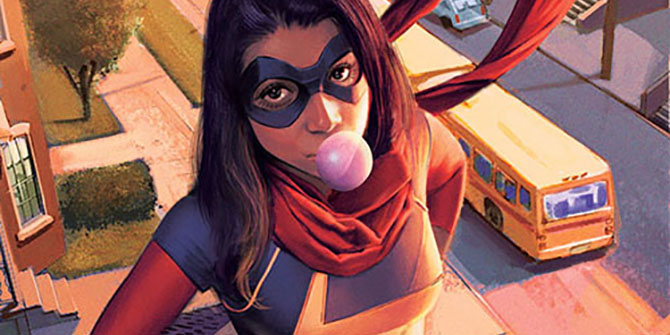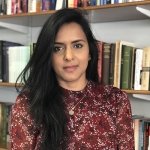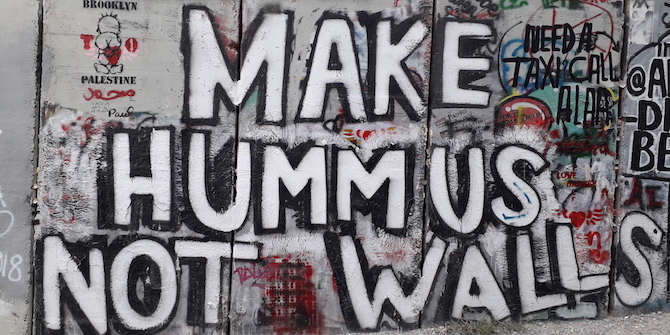by Jennifer Jackson-Preece & Manmit Bhambra

Can superheroes tell us something important about changing attitudes towards young Muslim women?
For decades, ‘those heroes were almost always white, always male, because that’s how it was’. But recently, ‘there has been an explosion of diversity’ in the superhero universe. Global comic brands like Marvel and DC have begun to ‘integrate and prominently feature Muslim and Arab heroes in their plots’.
This ‘turn to diversity’ in the comic industry has generated a great deal of media attention, in the Middle East and elsewhere. Much of it has been laudatory. But the arrival of more varied superheroes has also sparked controversy about public attitudes towards diversity in comics, and in society more generally. For example, in 2017, David Gabriel, Marvel’s Vice President of sales, blamed declining book revenues on ‘efforts to increase diversity and female characters, saying that readers “were turning their noses up” at diversity’.
Into this highly charged diversity debate, entered the comic book character Kamala Khan, aka Ms Marvel. It was the cover of Ms Marvel that featured in Gabriel’s controversial article – and the writer of Ms Marvel, G. Willow Wilson, was quick to rebut his claim: ‘if you’re going to write a smug thunk-piece about the “failure” of “diversity” in comics, maybe don’t use the cover image of a book that’s had 4 collections on the NYT graphic books bestseller list, won a Hugo and cleaned up at Angouleme.’
Created in 2013 for Marvel Comics, Kamala Khan is a 16-year-old Pakistani-American girl living in New Jersey. Kamala Khan and her family are devout Muslims. Her brother is a Salafi Muslim, her best friend wears the hijab, several scenes take place in a mosque and the Quran is cited as a source of inspiration.
Soon, this American Muslim immigrant family will even be coming to a big screen near you. In May 2018, it was announced that Kamila Khan, as Ms Marvel, will be the focus of a new ‘blockbuster film in which a Muslim will not be a threat but a kick-ass heroine’.
Ms Marvel has been hailed as an example of how comics can become catalysts for positive social change. But is this all just hype? What effect, if any, do comics really have on the public perception of identity? And does the same comic affect public perceptions of identity differently in different cultural contexts?
To answer these questions, we are comparing the reception of Ms Marvel in different locations in the Middle East and beyond. We are asking young women in London, Singapore and Beirut what they think about the first Ms Marvel comic book to feature Kamila Khan, No Normal.
We have employed a qualitative methodology, which uses semi-structured interviews as the primary investigative tool. This technique has worked well as it has given us the flexibility and space to respond to the individual perspectives that our respondents have wanted to share with us, whist being able to explore the key research questions central to our project.
We have now completed our semi-structured focus group discussions in London and Singapore, and are currently conducting research in Beirut. Our research so far has provided an interesting insight into the power of the comic book genre, as well as the intersectionalities between gender and culture.
Our preliminary findings suggest that a superhero like Ms Marvel can create a global discourse on gender that transcends specific cultural contexts. Ms Marvel’s struggle to find her true self even as she is gifted with a shape shifting superpower is a poignant metaphor for how young women everywhere must contend with issues related to body image and self-esteem. Whatever the cultural context, girls today are under enormous pressure to satisfy a socially determined ‘ideal’ of womanhood.
At the same time, we have also uncovered culturally specific meanings. For example, audience responses to the representation of the hijab within the comic vary between Western and non-Western settings.
Interestingly, agency is recognised by audiences in both contexts. To wear, or not to wear, the hijab is seen as a choice rather than an imposition. This shared understanding demonstrates that the young women who read Ms Marvel do not buy into Western stereotypes of the hijab as an instrument of female subjugation.
However, the meaning ascribed to choices surrounding the hijab is different. Western audiences are far more likely to interpret the hijab as a political statement on the relationship between secularism and multiculturalism. In contrast, for non-Western audiences, the hijab is mostly regarded as a religious expression of personal faith or family tradition.
But what about the bigger question here? Will diversifying the superhero universe make our everyday world more accommodating of diversity?
Thus far, we have found that young people interpret the move to greater diversity by Marvel in different ways. They seem to be split into two main groups, represented across all our locations. One group sees the Kamila Khan character as a positive step towards greater cultural understanding and a breakdown of majority–minority tensions. Conversely, the other group is concerned that this is merely a tokenistic gesture on the part of Marvel.
As we continue to explore the way Ms Marvel is understood across different contexts, we are gaining a more detailed understanding of how and why different groups of people form these perceptions, and what implications this may have for policies intended to support diversity.
Jennifer Jackson-Preece is an Associate Professor in Nationalism, with a joint appointment in both the European Institute and the Department of International Relations, LSE. Jennifer is also Principal Investigator on the LSE Middle East Centre project, ‘(Re)imagining Young Muslim Women? Comparing Public Responses to Ms Marvel in non-Muslim and Muslim Societies’.
is an Associate Professor in Nationalism, with a joint appointment in both the European Institute and the Department of International Relations, LSE. Jennifer is also Principal Investigator on the LSE Middle East Centre project, ‘(Re)imagining Young Muslim Women? Comparing Public Responses to Ms Marvel in non-Muslim and Muslim Societies’.
Manmit Bhambra is Research Assistant on the LSE Middle East Centre project, ‘(Re)imagining Young Muslim Women? Comparing Public Responses to Ms Marvel in non-Muslim and Muslim Societies’. She is also a Post-Doctoral Research Fellow at LSE and and a Fellow on the Generation Brexit project based in the European Institute.
is Research Assistant on the LSE Middle East Centre project, ‘(Re)imagining Young Muslim Women? Comparing Public Responses to Ms Marvel in non-Muslim and Muslim Societies’. She is also a Post-Doctoral Research Fellow at LSE and and a Fellow on the Generation Brexit project based in the European Institute.






